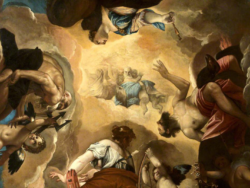
In a free society, there would be no strings attached to government funding for higher education because there would be no such funding in the first place. The reality, however, is that federal student loans will not be privatized anytime soon, and since almost every college in America uses them, such schools will continue to […]
Read More
“Sheet music is a bunch of black marks; they have no significance. I play violin, but in order to play well you have to be much more than a violin player. There is an entire world that lives together with it, like the currents in the ocean.” – Ivry Gitlis As a 2022 year-end exercise, […]
Read More
The Biden administration has released its plans to introduce a new income-driven repayment program for student loans. The proposed regulations are as bad as the early indications hinted they would be. For those just getting up to speed, a standard loan uses a fixed monthly payment and a predetermined number of payments (e.g., a car […]
Read More
While reading the American Anthropological Association’s (AAA) Declaration on Anthropology and Human Rights, I found myself in a situation similar to that confronted by David Hume some centuries ago. Hume, on reading the leading moral philosophers of his day, outlines the problem in these terms: In every system of morality, which I have hitherto met […]
Read More
Nearly 60 years ago, Martin Luther King, Jr. delivered his “I Have A Dream” speech at the Lincoln Memorial in Washington, D.C. King’s powerful plea for equal rights has resonated with Americans ever since, in no small part because his message was wrapped in an enlightened patriotism. He understood that the best way to fight […]
Read More
“… everything is queer today.” – Alice P. Oxy. LII 3679, 3rd century AD, with fragments of Plato’s Republic Near the end of Plato’s Republic, a gap opens in the form of the famous Allegory of the Cave at the beginning of Book 7. It’s among the most metaphorical gestures in all of Plato’s work. As such […]
Read More
“I don’t know how to say it any clearer.” “Got them in my livestock operation and that’s why we put a rope on some of them and take them to the slaughterhouse. That’s a fact of life with human nature and so forth, I don’t know how to say it any clearer.” At the invitation […]
Read More
Catherine E. Lhamon is the current Assistant Secretary at the U.S. Department of Education’s Office for Civil Rights (OCR). Despite the unassuming title, her position wields enormous power. The Assistant Secretary for Civil Rights, at her sole discretion, can cut off federal funding (and has threatened to do so) from any recipient educational institution she […]
Read More
Our founding document was designed to maintain a wall between your private life and government. Modern law schools profit by tearing it down. “A free society is as much offended by the dictates of an intellectual oligarchy as by those of an autocrat.” – Patrick Arthur Devlin, The Enforcement of Morals “In the social domain, […]
Read More
The James G. Martin Center for Academic Renewal recently published a report by Adam Kissel and Harrington Shaw that examines the financial quality of degree programs at North Carolina state universities. The authors use debt-to-earnings ratios, calculated from College Scorecard data, to evaluate the economic returns of these programs. Their report, in addition to providing […]
Read More
When a 33-year-old Thomas Jefferson defined America as a land that promises “life, liberty, and the pursuit of happiness” as inalienable rights, he laid out the vision for the American Dream. But as time went on, and as the tiny, fragile nation exploded into a world powerhouse, these grandiose promises were frequently blunted by tyrannical […]
Read More
Would it not be wonderful to be a Greek god? Imagine being Poseidon, god of the sea, who was able to create storms, earthquakes, and even horses. Or Ares, god of war, who possessed superhuman powers of speed and strength, allowing him to destroy his enemies, even entire armies, at will. This is pure mythology, […]
Read More
I recently read in the Wall Street Journal that Stanford University had more administrative staff and faculty than it did students. Specifically, there were 15,750 administrators, 2,288 faculty members, and 16,937 students. The paid help of 18,038 (administrators plus faculty) outnumbered the customers (students) by 1,101. That gave me an idea for a stunning administrative […]
Read More
In December 2008, Denis Rancourt was suspended from his tenured professorship in physics at the University of Ottawa—an action that resulted in his termination a few months later. This occurred after a five-year battle with university administrators. It was, according to “workplace mobbing” researcher Kenneth Westhues, a case in which the administration “coalesced in the […]
Read More
If you haven’t heard, “the college essay is dead.” The cause? ChatGPT, a large language model trained on a massive dataset of human text that can generate human-like writing in response to prompts or questions. Since its release, ChatGPT has produced a lot of educational handwringing because it puts at students’ fingertips a machine that […]
Read More
Neapolitan Overtime What is a constitution? In the very broadest sense, whether we refer to Moses’s ten commandments (1450 BC), the Magna Carta (1215), or the Articles of Confederation (1777–89), a constitution is a document that defines and reflects the existence of a people or a nation. A constitution doesn’t have to be a specific […]
Read More